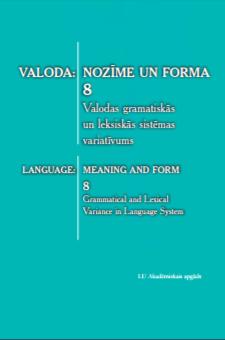Uzruna, vokatīvs, nominatīvs un akuzatīvs
Form of address, vocative, nominative and accusative
Author(s): Andra KalnačaSubject(s): Language studies, Language and Literature Studies, Baltic Languages
Published by: Latvijas Universitātes Akadēmiskais apgāds
Keywords: vocative; nominative; accusative; address; speech of speech; agreement;
Summary/Abstract: The article is devoted to the interesting, but insufficiently investigated topic – to the vocative and its usage in the forms af address. Other cases such as nominative and accusative in this function are also observed. The forms of address are analyzed from the angle of phonology-free and morphology-free syntax. The aim of the article is to discuss what are the relations between the VOC, NOM and ACC in the forms of address and the usage of case forms in the attributive function, expressing address. To reach the aim of the article the systematization of the inventory of the vocative forms and their functions in Latvian is given. The main conclusion is the following – phonology-free and morphology-free syntax is connected only with the forms of address where the head noun is in VOC, because the attribute (adjective, pronoun or declinable participle) can be both in NOM and ACC (mīļā māt! ‘dear.nom.f mother.voc.f’, mīļo māt! ‘dear.acc.f mother.voc.f’). If the head noun is in NOM or ACC, the attribute is in the same forms as noun (mīļais dēls! ‘dear.nom.m son.nom.m’, mīļo mammu! ‘dear.acc.f mummy.acc.f’), and here we cannot speak about morphology-free syntax.
Journal: Valoda: nozīme un forma
- Issue Year: 2017
- Issue No: 8
- Page Range: 79-90
- Page Count: 12
- Language: Latvian

